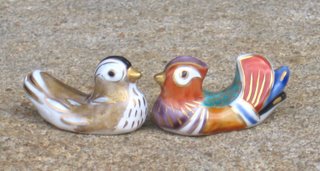:::::::::::::::::::::::::::::::::::::::::::::::::::::::::::::::::::::::::::::::::::::::::::::::::::::
Soojoo Henjoo 僧正遍照 Sojo Henjo
Sōjō Henjō (遍昭 or 遍照, 816 – February 12, 890) was a Japanese waka poet and Buddhist priest. His birth name was Yoshimine no Munesada (良岑宗貞). Thanks to a reference to him in the preface of Kokin Wakashū he is listed as one of the Six best Waka poets and one of the Thirty-six Poetry Immortals.
Henjō was the eighth son of Dainagon Yoshimine no Yasuyo, a son of Emperor Kammu who was relegated to civilian life. Henjō began his career as a courtier. He was appointed to the position of kurodo, a sort of Chamberlain of Emperor Nimmyō. In 849 he was raised to the Head of Kurodo (Kurōdonotō).
After Emperor Nimmyō died in 850, Henjō became a monk out of his grief.

He was a priest of the Tendai school. In 877 he founded Gankei-ji in Yamashina, in the southeast part of Kyoto. In 869 he was given another temple Urin-in in Murasakino, in the north of Kyoto and managed both temples. In 885 he was ranked in Sojo and called Kazan Sojo (花山僧正).
Henjō was famous for the following poem from the Hyakunin Isshu:
天津風雲の通ひ路吹き閉ぢよ
をとめの姿 しばしとどめむ
amatsu-kaze kumo no kayoiji fukutojiyo
otome no sugata shibashi todomen
Oh stormy winds, bring up the clouds
And paint the heavens grey;
Lest these fair maids of form divine
Should angel wings display,
And fly far far away.
© More in the WIKIPEDIA !

Portrait by Katsushika Hokusai
. Hyakunin isshu (百人一首) .
poetry collection
:::::::::::::::::::::::::::::::::::::::::::::::::::::::::::::::::::::::::::::::::::::::::::::::::::::

名にめでて折れるばかりぞ女郎花
我おちにきと人にかたるな 秋歌上
na ni medete oreru bakari zo ominaeshi
ware ochiniki to hito ni kataru na
I'm charmed by your name --
for that alone I plucked you.
O maidenflower,
don't tell anyone that
I have fallen from my vows.
Tr. L. Hammer
yellow flowered valerian, "maiden flower" ominaeshi
女郎花 (おみなえし)
Patrinia scabiosaefolia
The flower has been a favorite in Heian court poetry.
Matsuo Basho also wrote a parody about this poem:
見るに我も折れるばかりぞ女郎花
miru ni ga mo oreru bakari zo ominaeshi
when I look at you
I will also break my vows -
maidenflower
Tr. Gabi Greve
Written in the years of Kanbun, Basho age 18 to 29 寛文年間
When he was making the decision to leave Iga Ueno for Edo.
Matsuo Basho 松尾芭蕉
. ominaeshi 女郎花 maiden flower .
:::::::::::::::::::::::::::::::::::::::::::::::::::::::::::::::::::::::::::::::::::::::::::::::::::::
. Festivals, Ceremonies, Rituals - SAIJIKI .
[ . BACK to WORLDKIGO TOP . ]
[ . BACK to DARUMA MUSEUM TOP . ]
:::::::::::::::::::::::::::::::::::::::::::::::::::::::::::::::::::::::::::::::::::::::::::::::::::::








No comments:
Post a Comment